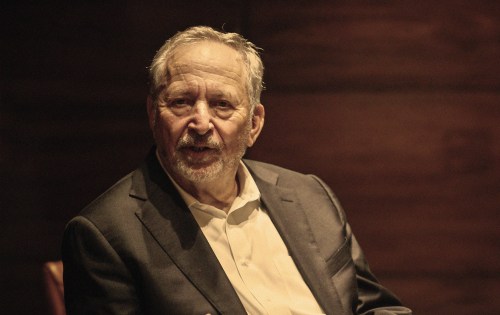Happy Wednesday! We're hosting a Premium Town Hall tonight at 8 p.m. ET. Join Steve Hayes and Jonah Goldberg as they talk about the biggest headlines and preview our newest project, The Next 250. Premium members can participate in the event live on Zoom.
Quick Hits: Today’s Top Stories
- The Senate voted 51-50 on Tuesday to pass the Trump-backed tax-and-spending bill, overcoming Democratic opposition following an overnight “vote-a-rama.” Republican Sens. Rand Paul of Kentucky, Susan Collins of Maine, and Thom Tillis of North Carolina joined Democrats in opposing the legislation, prompting Vice President J.D. Vance to cast the tie-breaking vote. The megabill now heads to the lower chamber, where House Speaker Mike Johnson has indicated he hopes to pass the measure by President Donald Trump’s July 4 deadline. The House narrowly advanced a similar budget bill in May, but the chamber must now vote on the revised Senate version before it can reach the president’s desk.
- Trump issued an executive order on Monday rescinding most U.S. sanctions on Syria, including those on the country’s central bank and armed forces. He first announced the decision, which he said was designed to give the country and its new government a “chance at greatness,” during a trip to Saudi Arabia in May. Sanctions on deposed Syrian dictator Bashar al-Assad and his allies will not be lifted. The order further instructs Secretary of State Marco Rubio to review Syria’s designation as a state sponsor of terrorism, and–along with Treasury Secretary Scott Bessent—consider lifting additional sanctions passed in the Caesar Syria Civilian Protection Act, which Trump signed in 2019 in response to reports of the Assad regime’s war crimes against civilians.
- A Moscow-appointed official in Ukraine’s Luhansk oblast said Tuesday that Russian forces have taken “100 percent” control of the eastern region. In September 2022, Russian President Vladimir Putin announced the annexation of Luhansk and three other Ukrainian regions, a violation of international law, but Ukrainian forces had thus far defended against a complete occupation by Russian troops. Ukrainian officials have not yet commented on the Russian-installed official’s claim. Meanwhile, French President Emmanuel Macron spoke to Putin on the phone for the first time since September 2022, pushing for a ceasefire in Ukraine and discussing concerns about U.S. strikes on Iranian nuclear sites.
- Thailand’s Constitutional Court suspended the country’s prime minister, Paetongtarn Shinawatra, on Tuesday pending an investigation into alleged ethics violations related to a leaked private phone call she held last month with Cambodian Senate President Hun Sen. Two weeks after an armed skirmish in late May between Thai and Cambodian troops in disputed border territory left one Cambodian soldier dead, Shinawatra told Hun Sen to ignore a Thai regional army commander who had criticized Cambodia. She further referred to Hun Sen—a friend of her father, former Thai Prime Minister Thaksin Shinawatra—as “uncle,” and offered to “arrange” any requests.
- U.S. District Judge Melissa DuBose issued a preliminary injunction on Tuesday that temporarily bars the Trump administration from downsizing the Department of Health and Human Services (HHS). “The executive branch does not have the authority to order, organize or implement wholesale changes to the structure and function of the agencies created by Congress,” she wrote. The HHS in late March announced “a dramatic restructuring” of the agency, including reducing personnel from 82,000 to 62,000 full-time employees, prompting Democratic attorneys general from 19 states and Washington, D.C., to sue the Trump administration.
- The Department of Justice on Tuesday announced federal charges against two Chinese nationals who allegedly gathered information on U.S. Navy service members and bases on behalf of the Chinese government’s intelligence agency. The DOJ further accuses them of attempting to recruit other U.S. military personnel as potential agents. “This case underscores the Chinese government’s sustained and aggressive effort to infiltrate our military and undermine our national security from within,” Attorney General Pam Bondi said in a statement. The pair was arrested on Friday, as part of a multi-state counterintelligence operation.
- Paramount, the parent company of the CBS television network and its news division, agreed late Tuesday to pay Trump $16 million in order to settle a lawsuit he filed against the company last year. Trump had sued the network for its editing of a 60 Minutes interview with then-Vice President Kamala Harris in October 2024, weeks before she lost the presidential election to Trump. Most of the settlement money will go toward Trump’s presidential library, and Paramount agreed to release written transcripts of 60 Minutes interviews with presidential candidates in the future. The settlement comes as Paramount is attempting to complete a merger with Hollywood studio Skydance, which requires approval by the Federal Communications Commission.
A message from Incogni
Your Personal Info Is Out There — Incogni Helps Wipe It Clean
Your home address, phone number, even your Social Security number—all are searchable online and often sold to marketers or exposed to scammers. Incogni automatically tracks down and removes your personal data from over 270 data broker sites. For even greater control, the Unlimited Plan lets you target any other sites you choose. Stay private, stay protected.
‘Nobel is Waiting!’

As a fragile ceasefire between Iran and Israel holds, the 20-month war between Israel and Hamas in the Gaza Strip showed signs of intensifying this week. On Sunday, the Israel Defense Forces (IDF) issued evacuation orders for large sections of northern Gaza, including areas of Gaza City where its forces have not operated in months.
But as the IDF prepares to expand the area of Gaza it controls beyond the roughly 75 percent it already holds, U.S. President Donald Trump is putting pressure on Israeli Prime Minister Benjamin Netanyahu to bring the war to an end. With Israeli diplomats visiting the White House this week, and Netanyahu set to arrive in Washington on Monday, Israel’s push to take over the remaining territory in which Hamas operates comes as the White House believes it has an opportunity to bring both sides to the negotiating table.
As a non-paying reader, you are receiving a truncated version of The Morning Dispatch. You can read our full item when you become a Dispatch member.
On Tuesday, Israeli Minister of Strategic Affairs Ron Dermer, one of Netanyahu’s top aides, visited the White House to meet with U.S. special envoy to the Middle East Steve Witkoff. Dermer was reportedly presented with plans for a 60-day truce between Hamas and Israel, which would be accompanied by a deal to bring 10 of the remaining 5o hostages (23 of whom the Israeli government believes to be alive) held by Hamas home, along with 15 bodies of hostages who have died.
The White House has been ramping up pressure on both sides to reach a deal in recent days. On Friday, at an event celebrating another peace deal—an accord between the Democratic Republic of the Congo and Rwanda—Trump suggested that a ceasefire in Gaza could come as early as next week. “I think it’s close. I just spoke to some of the people involved,” he said. “We think within the next week we’re going to get a ceasefire.” But he has not elaborated on the details of a potential ceasefire deal.
The president has also shown a willingness to single out Netanyahu in particular. “Make the deal in Gaza. Get the hostages back!” Trump exhorted Netanyahu on social media early Sunday morning. On Tuesday, the president told reporters that he planned to be “very firm” with the Israeli leader when he comes to Washington next week.
In theory, a ceasefire would further the White House’s larger goals in the region. The Abraham Accords, a series of agreements from the first Trump administration, saw a number of Arab states normalize relations with Israel, including the United Arab Emirates, Bahrain, and Morocco. The White House is seeking to expand the landmark accords, confirming last week that it asked the new government of Syria to sign on during a meeting earlier this year. “We have some really great countries in there right now, and I think we’re going to start loading them up, because Iran was the primary problem,” Trump told Fox News’ Maria Bartiromo on Sunday.
Israel has alluded to the possibility of normalizing ties with its former adversaries. “We have an interest in adding countries, such as Syria and Lebanon, our neighbors, to the circle of peace and normalization, while safeguarding Israel’s essential and security interests,” said Foreign Minister Gideon Sa’ar Monday. But major Middle Eastern players, such as Saudi Arabia, have said they will not join the accords until the Palestinian issue is resolved to their satisfaction.
Even as the Trump administration’s patience wears thin, Israeli leaders have resolved to push forward with another offensive in Gaza in an effort to force Hamas to agree to peace terms. It’s an extension of a recent shift in strategy by the IDF in its campaign against the Palestinian terrorist group, from more limited offensives to a determined effort to hold territory.
“What we’ve seen over the last several months has been more of a push by Israel to take and hold ground,” Raphael S. Cohen, the director of the Strategy and Doctrine Program at the Rand Corporation’s Project Air Force, told TMD. “From a military perspective, if you do these sort of clearance operations and then these limited strikes, you’re always going to be stuck in a continuous game of whack-a-mole. So holding ground is really the only way you’re going to fully root out Hamas.”
Yet stationing IDF troops in Gaza for longer periods also exposes them to greater risk from ambushes by Hamas and other militants. Just last week, seven IDF soldiers were killed in southern Gaza after a Hamas fighter threw a bomb inside their armored vehicle; another servicemember was killed by an explosive device in northern Gaza on Monday. The attacks brought the total number of IDF deaths for June to 20, so far the deadliest month of 2025 for Israeli forces. “This renewed offensive comes at the cost of blood and treasure,” said Cohen.
The renewed offensive’s toll is already exacerbating existing tensions within Israeli politics and society. The IDF relies on an active-duty conscript army and reserve forces to provide most of its wartime fighting strength, but until this month, mandatory military service was restricted to Jewish Israelis of fighting age, along with Druze and Circassian men. Haredi, or ultra-Orthodox, Jews largely received exemptions from service, as have Israeli Arab citizens.
Following a protracted political and legal battle, the IDF is set to begin enforcing sanctions on Haredi draft dodgers this month, along with issuing call-up orders to some 54,000 yeshiva students. But the highly controversial effort, which ultra-Orthodox Jewish parties in the Knesset oppose for religious and cultural reasons, is for now unlikely to drastically alter which part of Israeli society bears the burden of the war effort. “You have a large part of the population that’s bearing an extremely heavy burden, and feeling that they are being asked to sacrifice while other parts of Israel are not,” Daniel Byman, the director of the Warfare, Irregular Threats, and Terrorism Program at the Center for Strategic and International Studies, told TMD.
Aside from the danger and inconvenience of military service itself, Israeli citizens are also feeling the economic strain of the conflict. A massive drop-off in tourism, rising war debt, and losses to the workforce due to reserve call-ups and internal displacement have slowed growth and depressed business activity.
Increasingly, Israelis want to see a resolution to the war. A poll conducted by the Israeli Walla News last week found that 67 percent of the Israeli public supports signing a ceasefire deal to secure the release of the remaining hostages held by Hamas. Last week, tens of thousands of protesters rallied in Tel Aviv to call for an end to the war and the return of hostages (a weekly occurrence that was put on hold during Israel’s 12-day war with Iran).
The question is whether the Netanyahu government will be willing to accept terms that result in the survival of Hamas as a political force. “The big sticking point, from the Israeli perspective, is what happens if Hamas offers to return the hostages on the condition that it will end the war and Hamas stays in power,” said Cohen.
Byman agreed. “A lot depends on how much Israel is willing to bend,” he said. “Can Israel accept a group that slaughtered 1,200 of its citizens to still be politically active on its border? That’s a tough ask.”
Netanyahu and other Israeli leaders have repeatedly said the war will only end with the administrative and military dismantling of Hamas. But in recent days, the prime minister has signaled there may be growing flexibility in how the Israeli government defines “defeat” for Hamas. “This victory opens up an opportunity for a dramatic expansion of the peace agreement,” Netanyahu said on Thursday, while discussing the recent Israeli strikes on Iran. “Alongside the release of our hostages and the defeat of Hamas, there is a window of opportunity here that must not be missed.”
On Tuesday night, it appeared that Netanyahu had taken a critical step toward a wider resolution of the conflict. “Israel has agreed to the necessary conditions to finalize the 60 Day CEASEFIRE, during which time we will work with all parties to end the War. The Qataris and Egyptians, who have worked very hard to help bring Peace, will deliver this final proposal,” wrote Trump on social media. “I hope, for the good of the Middle East, that Hamas takes this Deal, because it will not get better — IT WILL ONLY GET WORSE.” The White House did not provide any additional details, and Hamas has yet to respond.
But if this week truly is a significant step toward ending a nearly two-year war and further integrating Israel in the Middle East, one of Trump’s fondest ambitions may be realized: a Nobel Peace Prize. At least, that’s the opinion of some Israelis. As one poster during last week’s protests in Tel Aviv read, “President Trump, end the crisis in Gaza! Nobel is waiting!”
Today’s Must-Read
As catchphrases go, “speaking truth to power” is a beaut. It’s a storied expression that packs loads of meaning and emotional pow! into four short words. Like a deft line of poetry, “speaking truth to power” uses familiar words in an unfamiliar way to win attention and hold onto it. I have always admired the phrase and wanted to know more about it. And a couple weeks ago, I thought of putting it to use in an essay I was drafting on the war of pamphlets between the American colonies and Great Britain in the years leading up to the American Revolution. But as I went to do so, I hesitated. Would “speaking truth to power” in this context be, I wondered, anachronistic?
Toeing the Company Line
Where’s the Outrage?
Why Americans aren’t up in arms about the Big Beautiful Bill.
Larry Summers’ Unfashionable Truth
The former treasury secretary has a message—but do Democrats want to listen?
Sounding the Alarm on China’s Persecution of the Uyghurs
An exile says, ‘We need people to believe the story we’re telling.’
Don’t Outsource AI Governance Just Yet
Private governance can work for most technologies. AI is different.
Conservatism, if You Can Keep It
Celebrating William F. Buckley’s 100th birthday.
Worth Your Time
- Experts may not be able to plan a central economy, but could supercomputers? Probably not, Gary Saul Morson and Julio M. Ottino concluded in the Wall Street Journal. “It keeps happening—some shiny new idea or technology promises to solve all our problems. Give power to experts to arrange affairs ‘scientifically,’ and poverty, oppression, disease, war and all human ills will disappear. Today, we are asked to trust artificial intelligence,” they wrote. “We are witnessing the emergence of a new version of the old central-planning fallacy—the belief that complex social systems can be optimized through technological intervention, much as software systems are engineered. … Soviet planners were confident in their ability to organize society rationally. Instead of the waste and unemployment of capitalist countries, experts would allot resources selflessly and rationally. But there are limits, and central planning is an inferior way to deal with them. Vladimir Lenin and his successors failed catastrophically because, as Friedrich Hayek observed, knowledge is inherently decentralized and dispersed throughout society. The emergent properties of complex systems simply can’t be captured in centralized models, no matter how sophisticated.”
- As Russia’s costly invasion of Ukraine continues, how does Russian President Vladimir Putin keep morale high in his country? Decor and distraction, The Economist reported.“The Russian capital is enjoying a three-month festival called ‘Summer in Moscow.’ … Most of it is free. Pink, white and blue petunias in pots, amphitheatres of wildflower boxes and exotic plants fill every space. ‘The city looks like one giant flower bed,’ says Tatyana Malkina, a journalist. The centre is a display of paradisical life, with gardens, verandas, open-air classes in cooking and painting, artisanal ice-cream stations and pétanque and tennis.” But Putin wields both carrots and sticks to keep the population in line: “All this co-exists alongside an intensifying ideological campaign. … On June 29th the Kremlin published a new order which classifies any preparations for the mobilisation of society or institutions as a state secret. It also prohibits sharing data from vast areas of civilian-state interaction, from trade to science. Contact with the West is perilous. Prison sentences of up to eight years chill debate.”
Presented Without Comment
Reuters: Iran-Linked Hackers Threaten To Release Trump Aides’ Emails
Iran-linked hackers have threatened to disclose more emails stolen from U.S. President Donald Trump's circle, after distributing a prior batch to the media ahead of the 2024 U.S. election.
In online chats with Reuters on Sunday and Monday, the hackers, who go by the pseudonym Robert, said they had roughly 100 gigabytes of emails from the accounts of White House Chief of Staff Susie Wiles, Trump lawyer Lindsey Halligan, Trump adviser Roger Stone and porn star-turned-Trump antagonist Stormy Daniels.
Robert raised the possibility of selling the material but otherwise did not provide details of their plans. The hackers did not describe the content of the emails.
U.S. Attorney General Pam Bondi described the intrusion as “an unconscionable cyber-attack.”
Also Presented Without Comment
Axios: Trump Says DOGE May ‘Go Back And Eat Elon’
Also Also Presented Without Comment
Washington Free Beacon: State Department Yanks Visas From Rap Group That Called for Murder of IDF Soldiers
In the Zeitgeist
Fans of Tyler Childers might recognize the song “Oneida” from one of the country singer’s live concerts or a live concert recording, but the fan favorite has yet to appear on a studio recording. That is, until now: The first studio recording of “Oneida” will be released this morning as a single before his new album Snipe Hunter drops later this month. But until then, here he is performing the song a few years ago:
Let Us Know
Should Israel accept a deal that leaves Hamas in power?
















Please note that we at The Dispatch hold ourselves, our work, and our commenters to a higher standard than other places on the internet. We welcome comments that foster genuine debate or discussion—including comments critical of us or our work—but responses that include ad hominem attacks on fellow Dispatch members or are intended to stoke fear and anger may be moderated.
With your membership, you only have the ability to comment on The Morning Dispatch articles. Consider upgrading to join the conversation everywhere.